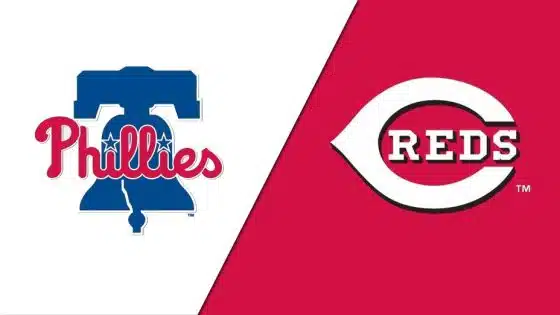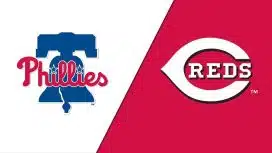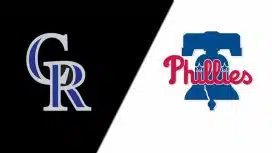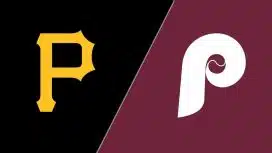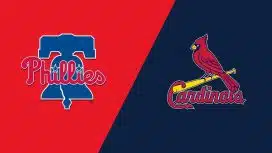By: Matt Alberston, Sports Talk Philly Historical Columnist
The MLB All-Star game was first played in 1933 as a one-time-only event at Chicago's Comiskey Park as part of the Chicago's World's Fair. But the game proved to be incredibly popular, with the game's greatest stars on the field together during one game.
Two Phillies – slugging outfielder Chuck Klein and shortstop Dick Bartell – started the game for the National League while two Philadelphia A's – first baseman Jimmie Foxx and pitcher Lefty Grove — were reserves on the American League roster managed by the Athletics' manager Connie Mack. The game proved so popular that it became a yearly event (except in 1945) enjoyed by baseball fans across the globe.
Philadelphia has hosted four MLB All-Star games, with the Phillies hosting three of the four in 1952, 1976, and 1996. Below is a brief overview of each game with interesting factoids that made each game unique.
(1952 All-Star game logo, Major League Baseball)
The 1952 All-Star Game was the first hosted by the Phillies at Shibe Park and is unique for several reasons. As graphic desiner Todd Radom pointed out, the 1952 All-Star game was the first to use a visual aid to promote the game (image above). He explained that, "One-off 'logos' may have been featured in scattered applications, but the 1952 All-Star Game saw a true branding strategy employed by the Phillies and by Major League Baseball."
The 1952 All-Star game was also the first to be televised and remains the only Midsummer Classic to be shortened due to rain. Three Phillies – pitcher Curt Simmons, shortstop Granny Hamner, and pitcher Robin Roberts – made the National League's roster that year, with Simmons and Hamner making the starting roster.
Jackie Robinson hit a home run in the first inning to put the National League up by one. The American League scored two runs in the top of the fourth inning to take the lead, but the National League struck back in the bottom of the frame when the Cubs' Hank Sauer hit a two-run home run to put the National Leaguers ahead before rain cancelled the game in the fifth inning.
(1976 All-Star game log, Major League Baseball)
The All-Star Game returned to Philadelphia in 1976 for America's bicentennial year. Philadelphia hosted all major sport All-Star Games and the men's NCAA Final Four in 1976 in commemoration of the American's 200th birthday. The game was the first held at Veterans Stadium. The 1976 game was the first time that both the United States and Canadian national anthems were played at the game, a tradition that continues to this day. The game itself was a one-sided affair, with the National League winning the game 7-1, extending their consecutive All-Star game's won streak to five in a row (the National League eventually won eleven consecutive midsummer classics between 1972 and 1982).
Five Phillies made the National League roster in 1976 – outfielder Greg Luzinski, catcher Bob Boone, second baseman Dave Cash, third baseman Mike Schmidt, and shortstop Larry Bowa – with Luzinski making the starting lineup. Former Phillie Robin Roberts served as honorary captain of the National League squad.
(1996 All-Star game logo, Major League Baseball)
The 1996 All-Star Game was held at Veterans Stadium and was the last time the game was held in Philadelphia. Over 62,000 fans attended the 1996 classic in what turned out to be another one-sided National League affair, as the National League won the game 6-0. It would be the last National League victory until 2010.
One of the largest crowds to witness an All-Star Game provided a Philadelphia flavor to the event when Blue Jays outfielder Joe Carter stepped into the batting cage for batting practice. Then-Philadelphia Inquirer staff writer Sam Carchidi explained the moment. "When he was introduced and took batting practice at 3:02 p.m., he was greeted with the sound that has made Philadelphia famous: Booooooooooo." It was not the last time Carter was booed during the festivities.
During the Home Run Derby, Carter hit a ball deep toward the left field foul pole. Phillies broadcaster Harry Kalas was the announcer during the event. While the ball was in flight and neared the foul pole, Kalas asked over the PA system whether the ball was fair or foul. The stadium erupted into cheers when the ball went foul by nearly ten feet. The only thing Carter could do was flash a grin; it was his first appearance at the Vet since Game 5 of the 1993 World Series.
Norristown, Pennsylvania native Mike Piazza went 2-3 in the game and was awarded the All-Star Game MVP. The Phillies' lone representative in 1996 was Ricky Bottalico. The 1996 All-Star Game remains the only game in which no walks were awarded during the game.

